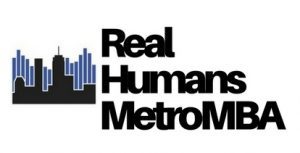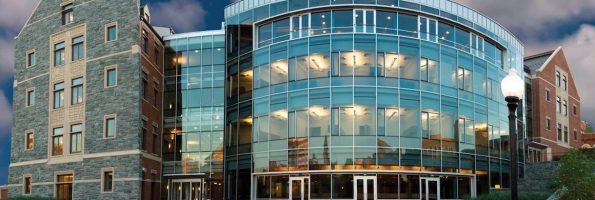The 5 Best DC Part-Time MBA Programs

The necessity of continuing to work while pursuing an MBA is a reality for many students. Part-time programs, built to fit into work and family schedules, are an increasingly sought after format for the MBA. The DMV metro area is home to some of the top part-time MBAs in the country. Here is a look at five of the best Washington DC part-time MBA programs.

Virginia Tech’s Pamplin School of Business’ evening part-time program recently jumped three places to 14th in U.S. News and World Report‘s rankings. Also ranked as the top public university part-time degree, the evening program at Pamplin begins in spring or fall, and can take anywhere from two-to-five years to complete, with the average student receiving an MBA in 3.5 years.
Part-time students at Pamplin can choose how many courses to take each semester, and the highly flexible format is fit for professionals who may be searching for a way to shift in their current career. According to Dean Robert Sumichrast, part of what makes Pamplin a leader in part-time education is its awareness of the needs of the working professional. “What we did at Virginia Tech a few years ago was to say that we really want to focus on the working [student]—someone who wants to enhance their career or make a change in the direction of their career … We want [professionals] to use what they’ve learned as part of the experience of the MBA program.”

Johns Hopkins’ Carey School of Business’ Flexible MBA also has the success of the working student at its forefront. With a degree “proven to get six-figure results” Carey’s flex MBA is online, in-person, or in a blended format. The program’s average length is 2.7 years and is comprised of 54 credits. With concentrations in Healthcare Management, Leading Organizations, and Marketing, the online courses are offered in eight-week terms. The in person delivery method, also comprised of eight-week terms, offers the additional concentrations of entrepreneurship, financial businesses, interdisciplinary business, and real estate and infrastructure.
While graduates of the Carey Flex MBA program succeed in a wide variety of industries, recent data shows that 67 percent of students landed in consulting positions, and 33 percent took roles in healthcare.

The University of Maryland’s Smith School of Business, allowed one part-time MBA student, Marie-Anne Audige, ’17, to realize that she was “much more resilient than I thought I was … Smith allowed me to take a leap of faith to start my business.” With classes available at three different campuses (Shady Grove, Downtown D.C. and Baltimore), Smith’s part-time MBA is one of the “most versatile MBA programs in the Washington D.C. region.”
With several different options available—24 months, 28 months, or a flexible, self-paced duration—Smith’s degree meets the professional in the middle between their education and career. Smith offers frequent info sessions, both in person and online, for those who wish to learn more about the flex programs in person. Classes are offered throughout the year in four terms.

Loyola University’s Sellinger School of Business also ranked among U.S. News and World Report’s top part-time MBA programs. Sellinger Professional MBAs may complete the program’s 33-42 credits at a self created pace, in as many as six years or as few as two and a half. Encouraging “students to align personal interests and career goals” with the curriculum, Sellinger has a wide variety of specializations from which to choose; professional MBAs can major in data analytics, finance, accounting, and marketing to name just a few.

Kogod School of Business at American University offers its top-ranked part-time online degree in a 24-month course sequence (completed by most students), but it can also be completed on a 12-month, 15-month, or 18-month track. Comprised of 48 credits, there are 12 core courses, three electives, and two in-person immersions.
The Kogod MBA is pointed squarely at helping businesses to grow, as stated on the program’s site. “The online MBA program prepares students to apply leadership and financial analysis skills to help businesses operate more effectively”. Students can choose from six concentrations or can customize their degree to their specific career goals. Concentrations include Business Analytics, Finance, International Business, Cybersecurity and Marketing.
Real Humans of the SMU Cox School of Business

After 100 years, one can expect a few changes.
The Southern Methodist University Cox School of Business, nearing it’s centennial celebration, is a perfect test-case for how much change can mean. Founded in 1920 as the Department of Commerce, the Dallas metro business school has gently evolved from a modern Methodist research beacon into one of the most transformative schools in Texas.

With over 11,000 students at SMU, including 5,170 graduate students, the Cox School of Business hosts nearly 600 MBAs in its various programs. For any Cox student, one of the definitive advantages of the business school is the advantageous proximity to Dallas’ thriving business community. Ten companies in the metro land within the Fortune 500 ranking. Among the group, four companies—Exxon Mobil, AT&T, Energy Transfer Equity, and American Airlines Group—land in the top 100, with two in the top ten. With high national regard, including a top 50 ranking for the school in U.S. News & World Report, plus the bevy of major companies as neighbors, these factors can seem overwhelmingly beneficial to a successful career.
When talking with members of the SMU Cox School of Business Professional MBA class, however, the allure of the program went beyond the obvious career benefits that Dallas can offer. For any well-regarded business school, the makeup of the class can seem familiar. The average GMAT for the PMBA Class of 2019 is 613. The GPA is 3.3. Most of the group has about five years of prior professional experience before enrollment. But just going off the bare statistics hardly tells the entire story.
To get a greater understanding of the SMU Cox School of Business Professional MBA class, we spoke with several current students, including a self-described “Army Brat,” a former law school student, and a consultant originally from Kathmandu, along with a handful of other future grads. Read on to see their stories and what the future may hold for life after an MBA.
Georgetown McDonough Announces New Flex MBA Program

In response to market research and student requests, Georgetown University’s McDonough School of Business is adding greater flexibility to its part-time MBA program. The updates include technological innovations for the inclusion of hybrid courses, new course delivery options, and a more adjustable duration. The idea behind the new Georgetown Flex MBA is to ensure that working professionals can better balance their career commitments with their personal commitments. Continue reading…
Zicklin MBA Ranking Jumps in US News, and More – New York City News

Let’s explore some of the most interesting stories that have emerged from New York City business schools this week.
U.S. News & World Report Names Baruch College Among Nation’s 2019 Best Graduate Schools – Zicklin News
The Baruch College Zicklin School of Business knocked it out of the park in the recently revealed U.S. News & World Report “2019 Best Graduate Schools” list. The full-time MBA ranked 55th nationwide (moving up two spots from the previous year), 29th nationwide among public institutions, first among public institutions in both NYC and New York state, 3rd in NYC overall, and 5th in New York State overall.
The business school’s part-time MBA also ranked 56th nationwide (a 22-spot jump from last year’s list), 34th nationwide among public institutions, first among public institutions in both NYC and New York state, 3rd in NYC overall, and 3rd in New York state overall. Willem Kooyker, Dean of the Zicklin School of Business Dr. H. Fenwick Huss, Ph.D., said in a release:
“Graduates of the Zicklin School of Business lead major businesses around the globe. Our student success is based on an ever-evolving curriculum that today includes data science and analytics, machine learning and cybersecurity along with experiential learning opportunities for real-world problem solving and strategic planning.”
Read more about Zicklin’s showing in the US News & World Report rankings here.
Living Abroad Leads to a Clearer Sense of Self – Columbia Business School Blog
Social scientists from Columbia Business School, Rice, and UNC universities have recently published new research in the journal Organizational Behavior and Human Decision Processes that finds how “living abroad increases “self-concept clarity.”
The findings came after the group surveyed roughly 2,000 “participants from online panels and United States and international MBA programs” that had, at one point, studied abroad.
Entitled “The Shortest Path to Oneself Leads Around the World: Living Abroad Increases Self-Concept Clarity,” the study reveals that “living abroad triggers self-discerning reflections in which people grapple with the different cultural values and norms of their home and host cultures. These reflections are helpful in discovering which values and norms define who people are and which simply reflect their cultural upbringing.”
You can check out the rest of the study here.
Goldman Sachs Executive Recounts Journey to Success in Finance – Gabelli Connect
Goldman Sachs President and Co-Chief Operating Officer Harvey M. Schwartz used his recent Fordham Wall Street Council talk as an opportunity to discuss his unlikely journey from a post-high school gym employee to Wall Street innovator as he stands on the precipice of retirement.
“Innovation is present in financial services. I think that if you have an interest in solving complex problems for clients or specific areas of markets, there is a unique way to participate. The takeaway should be that if you work hard, people will invest in you.”
Glean more wisdom from Schwartz’s talk here.
How Fast Can You Earn an MBA?

The process of earning an MBA is an exciting and often transformational time in someone’s life—and for some people, the faster you can get through it, the better.
The benefits of earning an MBA, such as increased post-graduate salary, career advancement potentials, and development of a strong business network, remain true regardless of how long it takes to complete your degree program. Completing your degree quickly just means reaping the benefits faster, while limiting the amount of time without an income.
MBA graduates are a diverse group—not only are they rising business leaders, but they are also parents, community organizers, and working professionals. With so many different types of MBA programs available, such as Online or Accelerated MBAs, students can choose the best program for their busy life and time constraints.
The average time it takes to complete your MBA can vary depending on the school, program, and type of degree. Below, we’ve rounded up the most important information regarding the average program length and schedule for a variety of MBA programs throughout and beyond the United States.
How Fast You Can Earn a Full-Time MBA?
With so many options to truncate the amount of time it takes to complete an MBA, it may seem strange that someone would still choose to pursue a full-time degree. Nevertheless, there are still numerous benefits to pursuing your MBA full time. Among these benefits is the increased opportunity for full-time students to get fully involved in the goings on of their university and business school. From student organizations to case competitions to hands-on experiences, full-time students have committed their full schedule to their business education and most certainly reap the benefits when it comes to skills and network development. Furthermore, taking time off of work to pursue your degree full-time leaves you open for more opportunities- such as traveling for study abroad, business plan competitions or corporate visits- that likely wouldn’t be possible for someone working while they’re in school.
The average full-time MBA degree today typically require around 30-60 credit hours, with variation depending on the program. With the typical course load asking students to take three courses (nine credits) per semester, the average full-time MBA can be expected to be completed in two full years. Most full-time programs begin in August or September and take four semesters for students to complete their required work, earning their degree by May or June of the second year.
Since the number of credits required by a particular program can vary, some full-time MBAs may be able to be completed faster than two years. Whereas programs like the full-time MBA at NYU’s Stern School of Business takes two years and requires 60 credits, a program like the full-time MBA at McMaster University’s DeGroote School of Business can be completed in as few as 16 months.
How Fast You Can Earn a Part-Time MBA?
A part-time MBA is the perfect option for someone who doesn’t want to put their career on hold while they earn a degree. With a flexible and often self-paced schedule, students are able to complete their degree in a time frame that works best for them, with classes typically offered at night or on the weekends.
While the benefits of a flexible schedule are enormous, one downside is that taking less courses each semester will ultimately extend the amount of time it takes to complete your degree. Typically, students pursuing their MBA part-time will earn their degree in three years, but this can vary significantly—not just depending on the program, but the person! For example, the top part-time MBA program at Northwestern University’s Kellogg School of Management can take anywhere from 1.25 to five years to complete.
What About an Accelerated MBA?
It’s right there in the name—the Accelerated MBA is all about earning a quality business education quickly and jumping right back into work. Most accelerated MBA programs can be completed in just twelve months if pursued full-time, or twenty-four months on a part-time schedule.
Of course, completing a degree in this length of time takes an impressive commitment. Unlike other programs that have winter and summer breaks between the semesters, many Accelerated MBA programs have shortened vacation periods and will require students to continue working throughout the summer.
Not every school offers a One Year or Accelerated MBA options, but those that do take these programs seriously and ensure that the same quality education received in a full-time degree program can be provided to students in just one year. Programs like the One Year MBA at Emory University’s Goizueta Business School boast impressive statistics, such as a 5:1 student to faculty ratio and a 93 percent success rate for graduates receiving employment within three months of completing their degree.
Is An Online MBA a Faster Option?
The world of Online MBAs is a diverse one with a wide array of options to choose from. Really, the only commonality between all online programs is where the classes take place—online! These programs provide for maximum flexibility where students can pursue their education from the comfort of their own homes—or wherever the world may take them.
Online MBAs come in all shapes and sizes, but typically require an average of around 30 credit hours. Depending on the university schedule, this can take up to two years to complete. At Temple University’s Fox School of Business, for example, the Online MBA program can be completed in 20 months, and includes a one week long opening residency. Some schools may also offer their part-time or Accelerated MBA programs in an online format. At the Kogod School of Business at American University, their AACSB-accredited online MBA involves 48 total credits but can be completed in just one year.
What About an Executive MBA?
The Executive MBA is a program designed for professionals with several years of work experience under the belt, who are looking for an MBA education to enrich their professional experience and open new career opportunities. Since this degree is targeted towards working professionals, it is typically structured so that students can keep working full-time, taking classes in the evenings and weekends.
On average, Executive MBA programs will take up to two years to complete, though this is typically a very part-time schedule. One of the top ranked EMBA programs in the country is the Executive MBA at Fordham University Gabelli School of Business, which can be completed in 22 months by attending class for one three-day weekend per month.
From your first day of classes to graduation, a world-class business education is typically no more than two years away. However, the flexibility of many programs put the power in the student’s hands: important factors like your schedule, finances, and the impact of taking time off of work should all factor into your decision about what type of MBA to pursue.
Kings of the North: Should You Get a Part-Time MBA in Chicago or Toronto?

In many ways, Chicago and Toronto are very similar world class cities: Both are situated on a Great Lake, host an “Original Six” hockey team, and both metros suffer from “second city” inferiority complexes. Both metros also have plenty of competitive business school options for professionals who want to earn an MBA. Continue reading…
